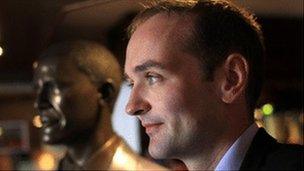EU fiscal treaty debate failing to ignite in Ireland
- Published

Henry Healy has developed a taste for politics
Not even the intervention of President Barack Obama's distant cousin has ignited the debate in Ireland over whether to ratify the new EU fiscal treaty.
It has been a relatively low-key campaign and, in many ways, that is just what the Irish government wanted.
For the past month, opinion polls have indicated the treaty is likely to be passed by a comfortable majority, and the government strategy seems to be "make sure you do not lose the vote" rather than "go out and win it".
The Irish prime minister, Taoiseach Enda Kenny, has not taken part in any live TV head-to-head debates with opponents of the treaty. He has steered away from potential political banana-skins ahead of Thursday's vote.
The coalition government in Dublin has relied upon a "ground war" rather than an "air war". Politicians and supporters across Ireland's 26 counties have been knocking on doors and handing out leaflets.
That is where Barack Obama's eighth cousin has come in handy. Henry Healy helped to promote the "Yes" campaign in County Offaly.
He is from Moneygall, the small village where President Obama's ancestors lived in the 1850s before emigrating to America. The president came to visit a year ago to meet his distant cousin.
Henry Healy - nicknamed Henry the Eighth - has developed a taste for politics. This week he posed for the cameras with a large pro-treaty sign emblazoned with the slogan "Yes we can".
He said: "The only way forward for our country is to ratify the treaty - to ensure growth, jobs and prosperity.
"It will continue our recovery and lead us back to a more stable nation within the EU."
He condemned vandals who spray-painted local road signs with "No treaty" graffiti.
In County Longford, some Yes campaign posters have been defaced with slogans referring to the number of Irish young people emigrating to Australia to seek work.
The collapse of the Celtic Tiger economy has led to three years of austerity measures being implemented by the Irish government.
Irish punt
The new EU Fiscal Treaty was drawn up in response to the debt crisis.
It will force countries in the Eurozone to abide by strict new budget rules, or face sanctions.
Sinn Fein are leading the campaign against the treaty in Ireland, saying it will merely guarantee austerity for the foreseeable future.
Some believe the only way for Ireland to recover economically is to ditch the euro, and bring back the Irish punt.
James Reynolds from the Farmers For No group said: "Ireland must exit the Eurozone if we're to have any chance of achieving economic recovery, and if we've any chance of regaining our economic sovereignty.
"Imagine the benefit to Irish agriculture of a floating punt, being able to devalue and sell cheap beef exports into the UK market. Okay, some British farmers might not like it, but it would be a fantastic boost for rural Ireland."
At the moment, it is a minority view. The three largest parties in the Irish parliament support the treaty and the likelihood is that it will be passed.
The latest poll, for the Irish Times, predicted a 57-43 split in Thursday's vote.
In some ways, the debate has turned into a battle between anger and fear.
Anger about austerity is likely to lead to protest votes against the government, and therefore against the treaty.
However, the fear that things could become even worse in Ireland if the treaty is rejected is also strong.
"We're damned if we do, and we're damned if we don't," said one Dundalk woman struggling to work out which way to vote.
When pushed, she admitted she was edging towards voting Yes.
Almost a third of voters are estimated to still be undecided, but the reality is that many will simply not vote at all.
The issues involved are complex, and the turn-out will not be huge.
It will take a highly dramatic last-minute surge against the treaty for it to be defeated.
Given the lack of drama in the campaign so far, that seems extremely unlikely.
- Published25 May 2012
- Published2 March 2012
- Published9 February 2012